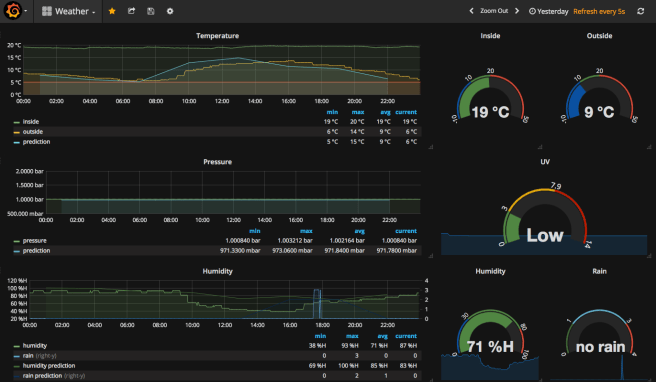Today I want to play with Grafana. Let me show you my idea:
I’ve got a Beewi temperature sensor. I’ve been playing with it previously. Today I want to show the temperature within a Grafana dashboard.
I want to play also with openweathermap API.
Fist I want to retrieve the temperature from Beewi device. I’ve got a node script that connects via Bluetooth to the device using noble library.
I only need to pass the sensor mac address and I obtain a JSON with the current temperature
#!/usr/bin/env node
noble = require('noble');
var status = false;
var address = process.argv[2];
if (!address) {
console.log('Usage "./reader.py <sensor mac address>"');
process.exit();
}
function hexToInt(hex) {
var num, maxVal;
if (hex.length % 2 !== 0) {
hex = "0" + hex;
}
num = parseInt(hex, 16);
maxVal = Math.pow(2, hex.length / 2 * 8);
if (num > maxVal / 2 - 1) {
num = num - maxVal;
}
return num;
}
noble.on('stateChange', function(state) {
status = (state === 'poweredOn');
});
noble.on('discover', function(peripheral) {
if (peripheral.address == address) {
var data = peripheral.advertisement.manufacturerData.toString('hex');
out = {
temperature: parseFloat(hexToInt(data.substr(10, 2)+data.substr(8, 2))/10).toFixed(1)
};
console.log(JSON.stringify(out))
noble.stopScanning();
process.exit();
}
});
noble.on('scanStop', function() {
noble.stopScanning();
});
setTimeout(function() {
noble.stopScanning();
noble.startScanning();
}, 2000);
setTimeout(function() {
noble.stopScanning();
process.exit()
}, 20000);
And finally another script (this time a Python script) to collect data from openweathermap API, collect data from node script and storing the information in a influxdb database.
from sense_hat import SenseHat
from influxdb import InfluxDBClient
import datetime
import logging
import requests
import json
from subprocess import check_output
import os
import sys
from dotenv import load_dotenv
logging.basicConfig(level=logging.INFO)
current_dir = os.path.dirname(os.path.abspath(__file__))
load_dotenv(dotenv_path="{}/.env".format(current_dir))
sensor_mac_address = os.getenv("BEEWI_SENSOR")
openweathermap_api_key = os.getenv("OPENWEATHERMAP_API_KEY")
influxdb_host = os.getenv("INFLUXDB_HOST")
influxdb_port = os.getenv("INFLUXDB_PORT")
influxdb_database = os.getenv("INFLUXDB_DATABASE")
reader = '{}/reader.js'.format(current_dir)
def get_rain_level_from_weather(weather):
rain = False
rain_level = 0
if len(weather) > 0:
for w in weather:
if w['icon'] == '09d':
rain = True
rain_level = 1
elif w['icon'] == '10d':
rain = True
rain_level = 2
elif w['icon'] == '11d':
rain = True
rain_level = 3
elif w['icon'] == '13d':
rain = True
rain_level = 4
return rain, rain_level
def openweathermap():
data = {}
r = requests.get(
"http://api.openweathermap.org/data/2.5/weather?id=3110044&appid={}&units=metric".format(
openweathermap_api_key))
if r.status_code == 200:
current_data = r.json()
data['weather'] = current_data['main']
rain, rain_level = get_rain_level_from_weather(current_data['weather'])
data['weather']['rain'] = rain
data['weather']['rain_level'] = rain_level
r2 = requests.get(
"http://api.openweathermap.org/data/2.5/uvi?lat=43.32&lon=-1.93&appid={}".format(openweathermap_api_key))
if r2.status_code == 200:
data['uvi'] = r2.json()
r3 = requests.get(
"http://api.openweathermap.org/data/2.5/forecast?id=3110044&appid={}&units=metric".format(
openweathermap_api_key))
if r3.status_code == 200:
forecast = r3.json()['list']
data['forecast'] = []
for f in forecast:
rain, rain_level = get_rain_level_from_weather(f['weather'])
data['forecast'].append({
"dt": f['dt'],
"fields": {
"temp": float(f['main']['temp']),
"humidity": float(f['main']['humidity']),
"rain": rain,
"rain_level": int(rain_level),
"pressure": float(float(f['main']['pressure']))
}
})
return data
def persists(measurement, fields, location, time):
logging.info("{} {} [{}] {}".format(time, measurement, location, fields))
influx_client.write_points([{
"measurement": measurement,
"tags": {"location": location},
"time": time,
"fields": fields
}])
def in_sensors():
try:
sense = SenseHat()
pressure = sense.get_pressure()
reader_output = check_output([reader, sensor_mac_address]).strip()
sensor_info = json.loads(reader_output)
temperature = sensor_info['temperature']
persists(measurement='home_pressure', fields={"value": float(pressure)}, location="in", time=current_time)
persists(measurement='home_temperature', fields={"value": float(temperature)}, location="in",
time=current_time)
except Exception as err:
logging.error(err)
def out_sensors():
try:
out_info = openweathermap()
persists(measurement='home_pressure',
fields={"value": float(out_info['weather']['pressure'])},
location="out",
time=current_time)
persists(measurement='home_humidity',
fields={"value": float(out_info['weather']['humidity'])},
location="out",
time=current_time)
persists(measurement='home_temperature',
fields={"value": float(out_info['weather']['temp'])},
location="out",
time=current_time)
persists(measurement='home_rain',
fields={"value": out_info['weather']['rain'], "level": out_info['weather']['rain_level']},
location="out",
time=current_time)
persists(measurement='home_uvi',
fields={"value": float(out_info['uvi']['value'])},
location="out",
time=current_time)
for f in out_info['forecast']:
persists(measurement='home_weather_forecast',
fields=f['fields'],
location="out",
time=datetime.datetime.utcfromtimestamp(f['dt']).isoformat())
except Exception as err:
logging.error(err)
influx_client = InfluxDBClient(host=influxdb_host, port=influxdb_port, database=influxdb_database)
current_time = datetime.datetime.utcnow().isoformat()
in_sensors()
out_sensors()
I’m running this python script from a Raspberry Pi3 with a Sense Hat. Sense Hat has a atmospheric pressure sensor, so I will also retrieve the pressure from the Sense Hat.
From openweathermap I will obtain:
- Current temperature/humidity and atmospheric pressure in the street
- UV Index (the measure of the level of UV radiation)
- Weather conditions (if it’s raining or not)
- Weather forecast
I run this script with the Rasberry Pi crontab each 5 minutes. That means that I’ve got a fancy time series ready to be shown with grafana.
Here we can see the dashboard
Source code available in my github account.

One thought on “Playing with Grafana and weather APIs”